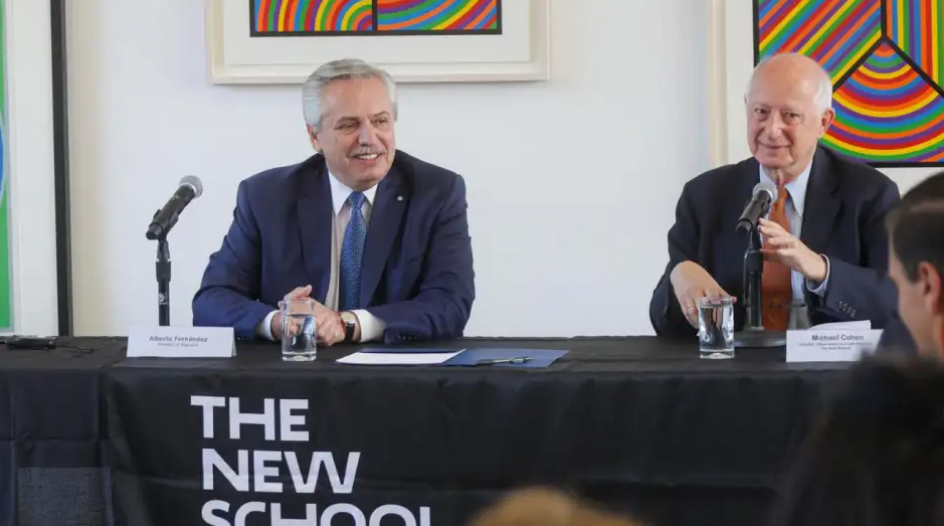
Argentine President Alberto Fernández Delivers an Address, “Facing Global Challenges: A Latin American Perspective,” at The New School
For years, The New School has cultivated relationships with scholars, leaders, and activists from Latin America. Guest speakers including Latin American presidents Dilma Rousseff, Tabaré Vázquez, Rafael Correa, Michelle Bachelet, and Néstor Kirchner have broadened and deepened the university’s relationship with the region. The university recently carried forward this tradition by presenting Alberto Fernández, president of Argentina, who delivered a speech titled “Facing Global Challenges: A Latin American Perspective.” The event was hosted by the Observatory on Latin America (OLA), an academic center of the Julien J. Studley Graduate Programs in International Affairs at the Schools of Public Engagement.
This event was President Fernández’s second appearance at The New School, which he first visited more than ten years ago to meet with students and speak about his experience serving as chief of cabinet for presidents Néstor Kirchner and Cristina Fernández de Kirchner. He was invited to speak not only as the president of Argentina but also as the president of the Community of Latin American and Caribbean States (CELAC). Michael Cohen, co-director of the OLA, professor of international affairs, and founding director of the Julien J. Studley Graduate Programs in International Affairs, observed in his welcoming remarks that President Fernández’s role in CELAC has been critical in bringing Argentina and Latin America as a whole into the global conversation, stating that “if you are not at the table, you are on the menu.” President Fernández shared his thoughts on current conditions including inequality, war, the COVID-19 pandemic, and climate change and stated that Argentina and Latin America could play a role in supplying energy and food, shortages of which have developed as a result of the conflict in Ukraine.
During his talk, President Fernández stated that the world has “changed, but it has not changed in its structure. Rather, the pandemic has exposed the weaknesses and miseries of the unjust system in which we live, the shortcomings and the structural weaknesses of that world.” He also discussed the impact of climate change on Latin America, emphasizing the effects on the South American continent and the Caribbean, where sea level rise threatens the existence of island nations.
President Fernández expressed concern about the escalation of violence and hate speech, describing it as “the new fascism” and noting that “there are no problems with the democratic right, but there should be no place for the right that promotes hatred. The same with the extreme left. Violence cannot have a place in the world we have.”
President Fernández proclaimed the need for an ethical approach to global issues, in which Latin America contributes to solving international problems while addressing national and local needs. He asserted that international financial institutions should not expect indebted countries to pay off their debt given the ongoing pandemic and the food and energy crises caused by the war in Ukraine.
This event reflected the strength of the relationship between The New School and Argentina, which has developed and grown over many years, built upon a solid foundation of collaboration and open discourse. Events highlighting that relationship include visits by former Argentine President Néstor Kirchner and the presentation of The New School’s University in Exile Award to the Grandmothers of the Plaza de Mayo, a prominent Argentine human rights organization.
The university has also hosted Argentine intellectuals such as the historian Tulio Halperin Donghi, the philosopher Jose Pablo Feinman, the NGO leader Alberto Croce, and the architect Berardo Dujovne. Recent visitors include Fernando Espinosa, the mayor of La Matanza, and religious leaders from across Argentina, who discussed how the different faiths live in Argentine society.
“These activities have built a close relationship which we have developed with the Argentine Consulate in New York,” said Cohen during the event. “All of this gives me confidence to say that Argentina and Latin America have never been an abstraction in this university. We have sent 175 master’s-level students to work and study for two months in Buenos Aires. We also sent hundreds of students to work in Brazil, Colombia, and Cuba. We have had dozens of students from all over Latin America. We have developed cooperation agreements with many Latin American universities, and some of our most distinguished faculty and academic leaders have spoken in Argentina. During this past summer, 20 of our students studying in Cuba met with the president of Cuba for two hours. Our relationships are deep, wide, and committed to social justice.”